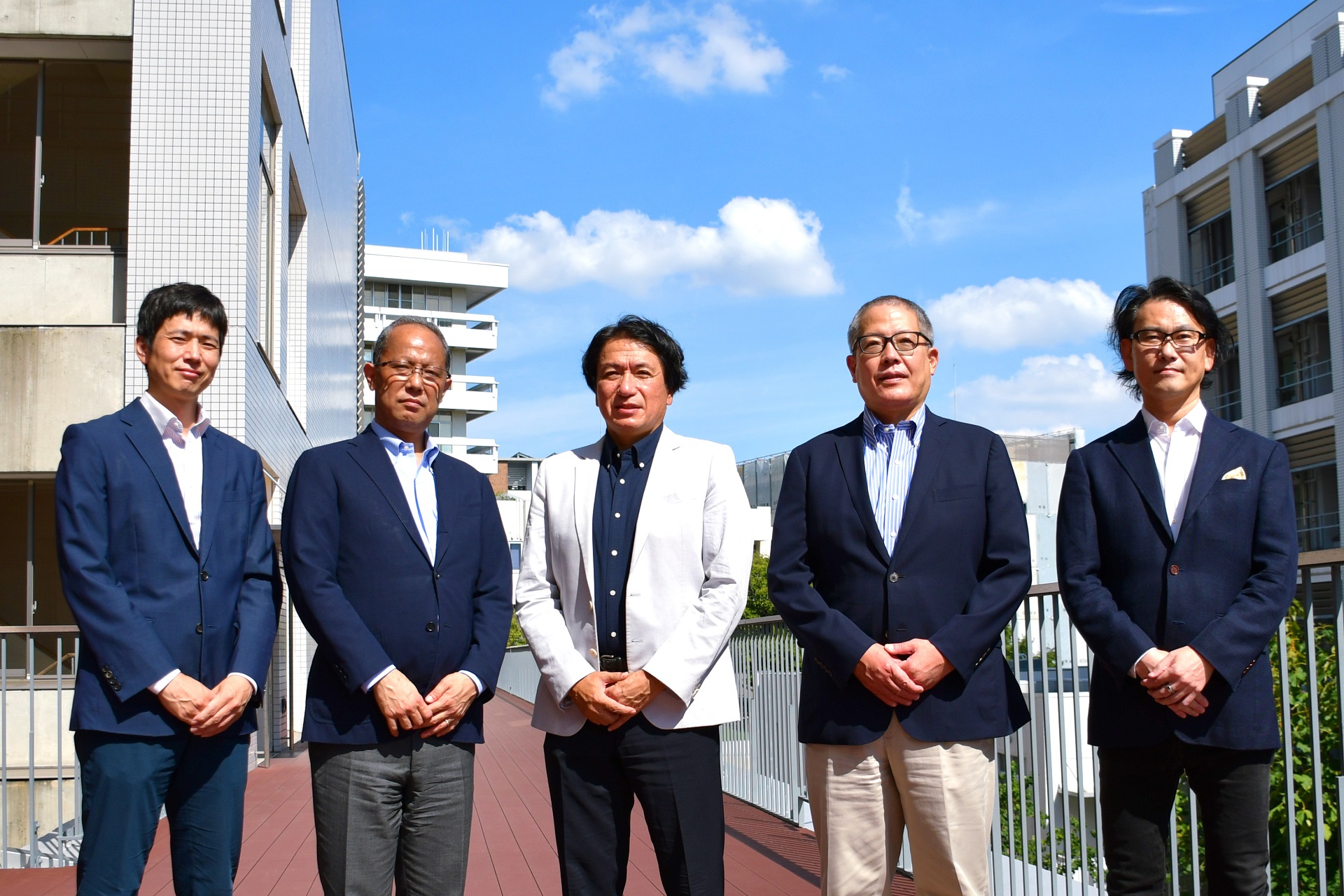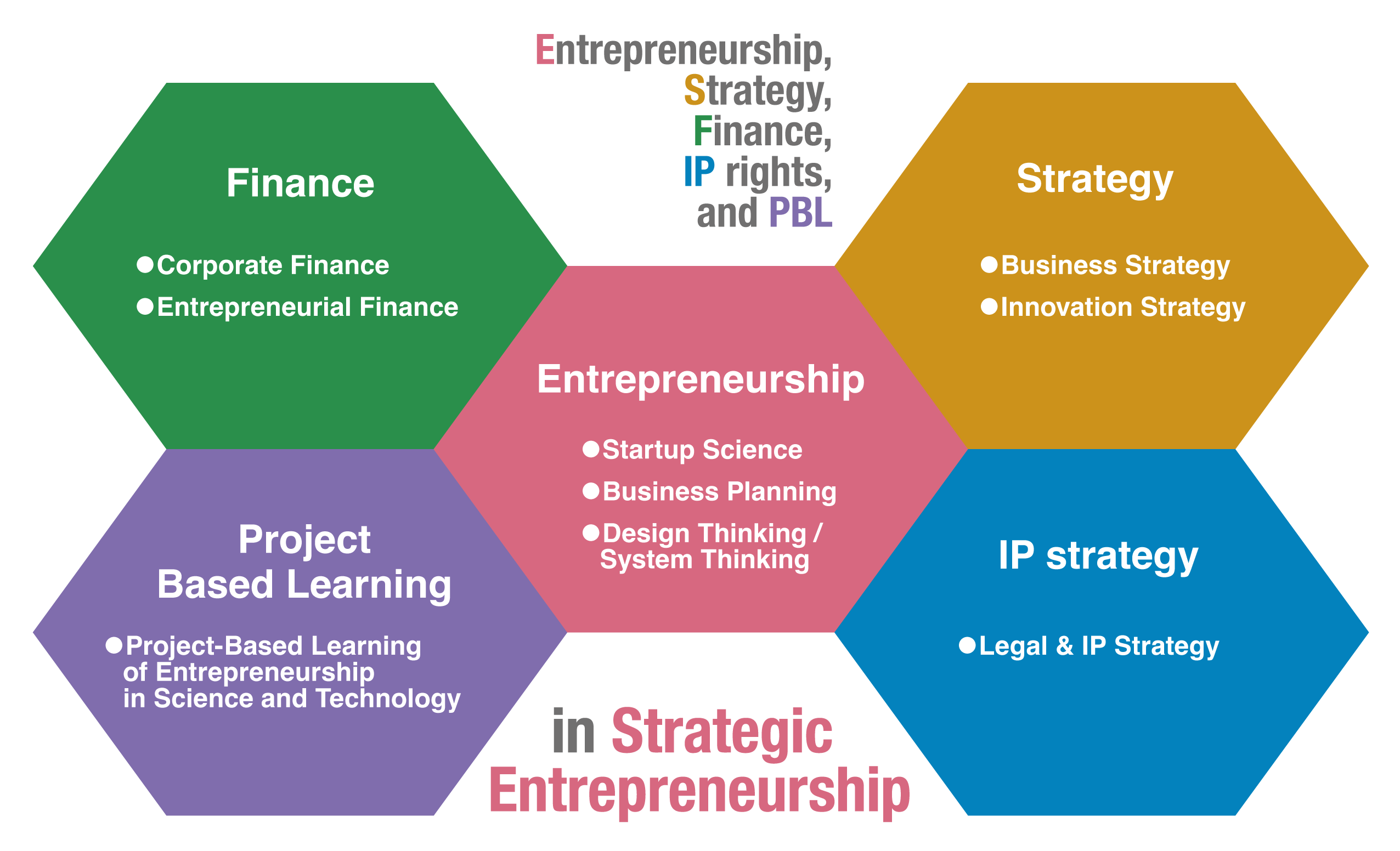Strategic Entrepreneurship
-
For an education in natural science, students are required to pursue ingenious research by studying thoroughly in their specialized areas. On the other hand, many companies are looking for talents who can create social and economic values by translating breakthrough which arises from natural science to innovative results. Especially in Japan, people who have those expertise are being needed for realizing economic growth.
STIN’s educational goal is to develop talented people who have knowledge such as entrepreneurship, strategy, finance, and intellectual property, which are essential for achieving innovation, as well as expertise in Bioproduction, Advanced Membrane Science and Technology, Advanced Information and Communication Technology, and Advanced Medicine and Pharmaceutical Sciences . -

-
Education and Research Strengths
-
In promising startup companies in a global market, people who have both natural science degree such as biology, chemical and engineering, and social science degree such as MBA, are playing active roles.
In a global competitive market, talents who understand entrepreneurship, science and technology have been increasingly regarded important.
Our Strategic Entrepreneurship Program is designed for students who have natural-science undergraduate degree to be able to acquire business knowledge, skills, and experience in real fields. Though education in natural science and one in social science are distinguished strictly in Japanese academic areas, we believe that STIN’s integrated education system is beneficial for business society which is looking for people of practical ability.
-
Outline of Subjects
-
【Masterʼs Program】
Entrepreneurship Courses taught in the master’s program cover the following five areas: Entrepreneurship, Strategy, Finance, Intellectual Property, and Project-Based Learning (PBL).
Unlike business schools (graduate schools of business administration) in general, our program is designed to ensure that students who have natural science background can efficiently acquire knowledge that is necessary for the creation of innovation (creation of social and economic values).
Entrepreneurship
Entrepreneurs should have vision and innovation ideas for solving social issues which can develop into a promising business plan.
Students can learn a process how to create a business based on innovation idea through lecture, case study, group project, and project-based learning.[Subject]
- Business Creation
- Innovation Cases Studies
- Design Thinking & System Thinking
Strategy
Entrepreneurs require not only entrepreneurship but also strategic thinking to minimize the risks involved in starting a business and maximize value creation.
Strategy theories required in innovation creation are continuously evolving, widely ranging from competition strategy and resource-based view to innovation strategy and marketing management.
Students learn the outlines of these theories, such as through lectures, case studies, and group work.[Subject]
- Strategic Management
- Innovation Management
Finance
Students study basic corporate finance, making of financial plan, corporate valuation, and design of deal structure, and further master execution skills of finance in enterprise creation thorough case studies and exercises.
[Subject]
- Basic Accounting and Finance
- Entrepreneurial Finance
Intellectual property strategy
Entrepreneurs should understand Intellectual Property (IP) Strategy when they try to realize innovation by using scientific breakthrough.
Students learn patent law, copyright law, and process how to acquire, utilize, and protect various IPs, which are necessary in realizing above mentioned innovation.[Subject]
- Legal & Intellectual Property Strategy
Project Based Learning: PBL
Students engage in group work in the first year of the master’s program. Students choose an existing science and technology venture firm, such as a biotech spinoff from STIN, and conduct detailed research and analysis into the firm’s technology, intellectual property, strategy, and finance. They will also think of a new business that they wish to propose to the firm and prepare a business plan through lectures and group work. A presentation workshop will be held at the end of the course for each group to present their business plan.
In the second year, each student will select one of the scientific themes pursued in the research lab they belong to and analyze what new business could be created from that theme. Finally, they will put together an innovation idea report. Multiple instructors will be involved in the process to provide advice from natural science, technology, intellectual property, strategy, and finance perspectives.
[Subject]
- Project-Based Learning of Entrepreneurship in Science and Technology
【Doctoral Program】
The doctoral program aims to nurture and produce science and technology entrepreneurs who can achieve breakthroughs in advanced science and technology fields (such as Bioproduction, Advanced Membrane Science and Technology, Advanced Information and Communication Technology and Advanced Medicine and Pharmaceutical Sciences, and interdisciplinary fields) and at the same time build a concrete innovation strategy based on such breakthroughs.
Here, the term entrepreneur refers to the following human resources:
- (1) Independent entrepreneurs who start venture firms and lead an active career while exerting a significant impact on society
- (2) Corporate entrepreneurs who launch new businesses within an existing organization by leveraging advanced science and technology
- (3) Researchers and educators who practice research and education on science and technology innovation from an interdisciplinary perspective integrating science and humanities
The STIN doctoral program offers education in line with the career path each student wishes to pursue (i.e.,., independent entrepreneur, corporate entrepreneur, or researchers and educators) through a curriculum designed to cultivate the three main skill sets necessary for science and technology entrepreneurs (skill sets to carry out advanced R&D, identify opportunities, and build strategies) under an interdisciplinary system integrating science and humanities.
Advanced Science and Technology Research Courses
(Cultivation of skills to carry out advanced R&D)Cultivates the skills required to identify important issues in science and technology, to set a specific problem, to achieve breakthroughs (discovery or invention) to solve that problem, and to write and submit academic papers and make presentations.
[Subject]
- Advanced Science and Technology Research
Research on Science, Technology and Innovation Courses
(Cultivation of skills to identify opportunities)Cultivates the skills required to utilize advanced scientific and technological breakthroughs and build ideas for translating them into products and services that create economic and social values. Furthermore, cultivates the skills required to build an innovation idea by leveraging systems and design thinking to translate ideas into products and services.
[Subject]
- Research on Science, Technology and Innovation 1
- Research on Science, Technology and Innovation 2
Science and Technology Entrepreneurship Courses
(Cultivation of skills to build strategies)Offers education on intellectual property, strategy, and finance necessary for translating an innovation idea into products and services according to the student’s level of experience in practical business management. Through this process, students will cultivate practical skills on innovation strategies.
Furthermore, under an interdisciplinary system integrating science and humanities, students will deeply explore innovation ideas that will lead to the creation of economic and social values and promote R&D projects that translate science and technology breakthroughs into innovative products and services. Students will put their research findings together in an innovation strategy research report.
[Subject]
- Science and Technology Entrepreneurship
- Science, Technology and Innovation Strategy Project Research